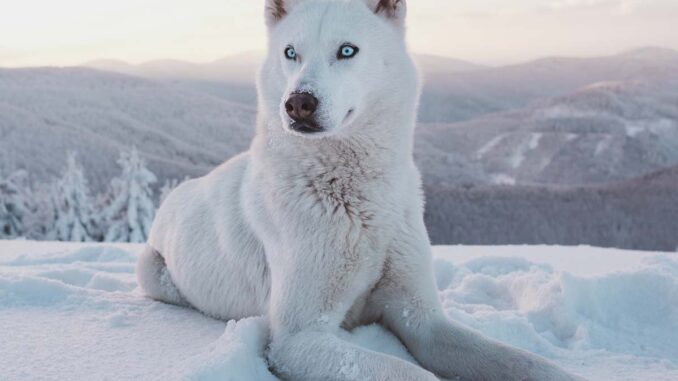
Husky is used as a general term for a dog in the colder regions, typically as sled dogs. These dogs are the traditional northern type, which are notable for their cold-weather tolerance. Huskies are energetic and athletic.
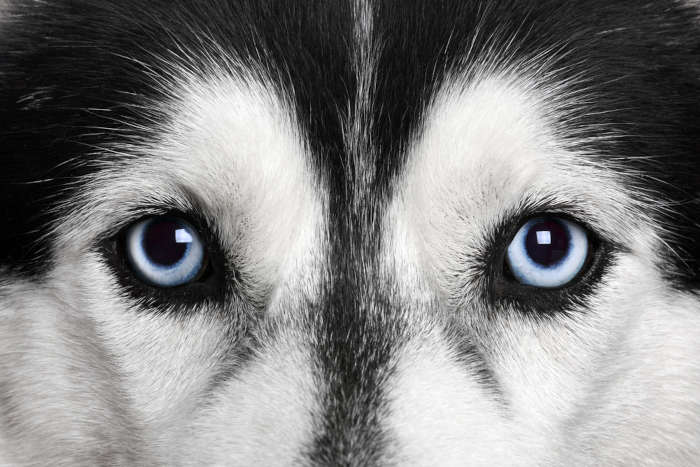
They have a thick double coat which comes in a variety of colors. This double coat helps protect them against harsh winters and warmer weather. In hotter climates, their undercoats are shed to cool themselves.
Husky breeds include the Alaskan husky, Labrador husky, MacKenzie River husky, Sakhalin husky, and Siberian husky. In this article, we will review the different types of husky breeds as well as husky cross-breeds and other dog breeds who look like huskies.
1. Small dog breeds which resemble a husky
Finnish Spitz
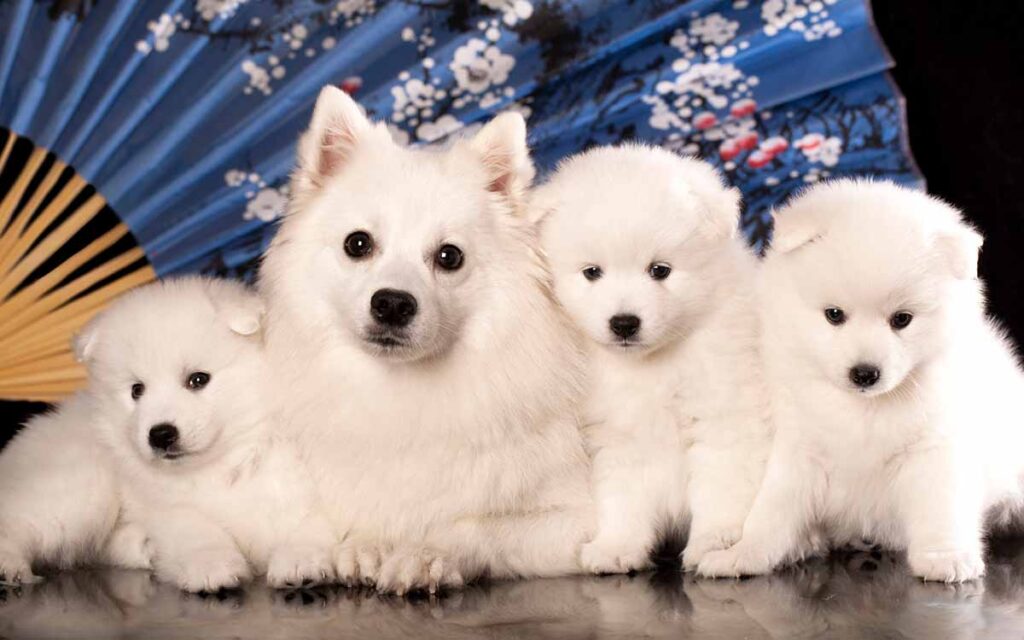
- Exercise: They need one or two long walks every day, but will be fairly inactive indoors. They need a good balance between outdoor exercise and indoor play time.
- Health Issues: This breed is healthy, but can suffer from elbow dysplasia, epilepsy, hip dysplasia, and patellar luxation. The breed’s median lifespan is about 11 years.
- Temperament: This breed is alert and lively. They are an independent breed who are close to their family. Spitz aren’t attached to strangers but is protective. Spitz are strong-willed who don’t respond well to harsh training.
- Family: Finnish Spitz interacts well with people and is good with children. They always want to play with children. This breed gets along well with other dogs. However, they are unreliable around small animals and birds because they were bred as a hunting dog. Individuals may be good with cats, but there’s no standard.
Samoyed
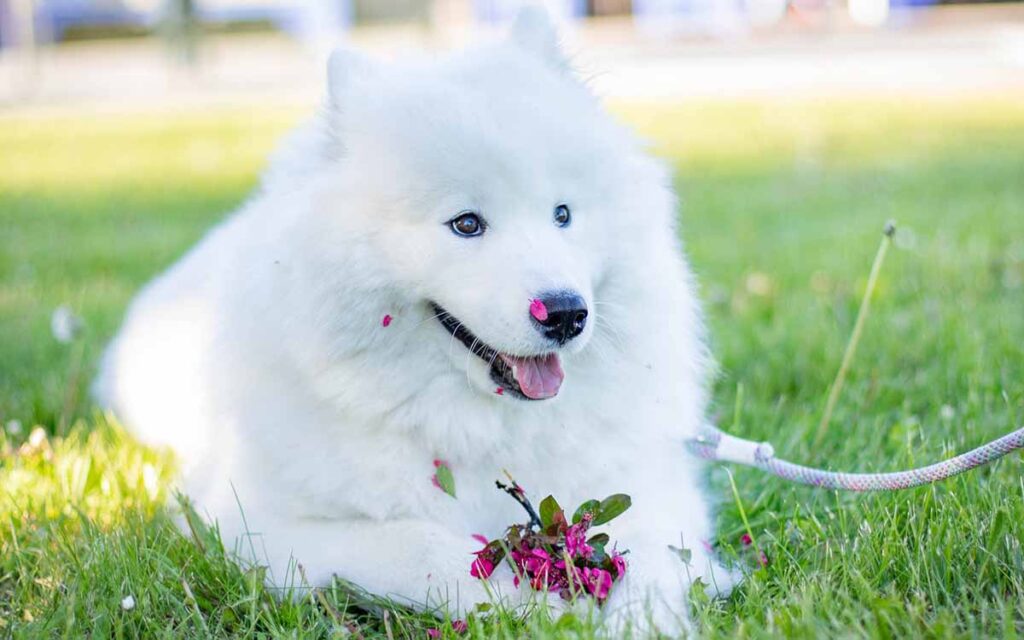
- Exercise: They need plentiful exercise, otherwise they will dig or become destructive. They can be trained to compete in agility and obedience events.
- Health Issues: The main issue is a genetic disease known as Samoyed hereditary glomerulopathy, which eventually leads to kidney failure. Additionally, they may have diabetes or eye issues.
- Temperament: Samoyed are friendly and affable, which makes them poor guard dogs. They are known for their “Sammie Smile”. The breed remains active in old age.
- Family: Samoyeds are excellent with small children and other dogs.
American Eskimo Dog
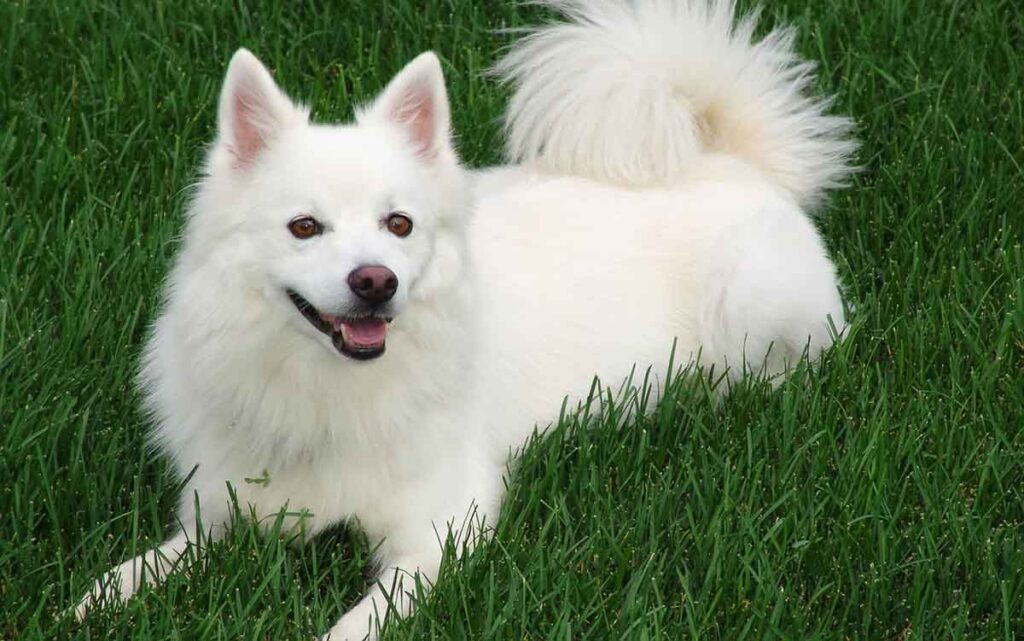
- Exercise: These dogs are active with lots of energy. They require much exercise and mental stimulation, otherwise, they will become destructive. Plentiful toys would be good for this breed.
- Health Issues: Eskimos are prone to hip dysplasia and progressive retinal atrophy.
- Temperament: This breed isn’t shy or aggressive, but is always alert. They are conservative when making friends but are loyal to their owners. Eskimos are among the most trainable breeds who are eager to please their family members.
- Family: This breed forms a strong bond with owners and loves interacting with them. They can tolerate other dogs and cats if they are raised with them. However, they should be kept away from small pets such as birds and reptiles.
Pomeranian
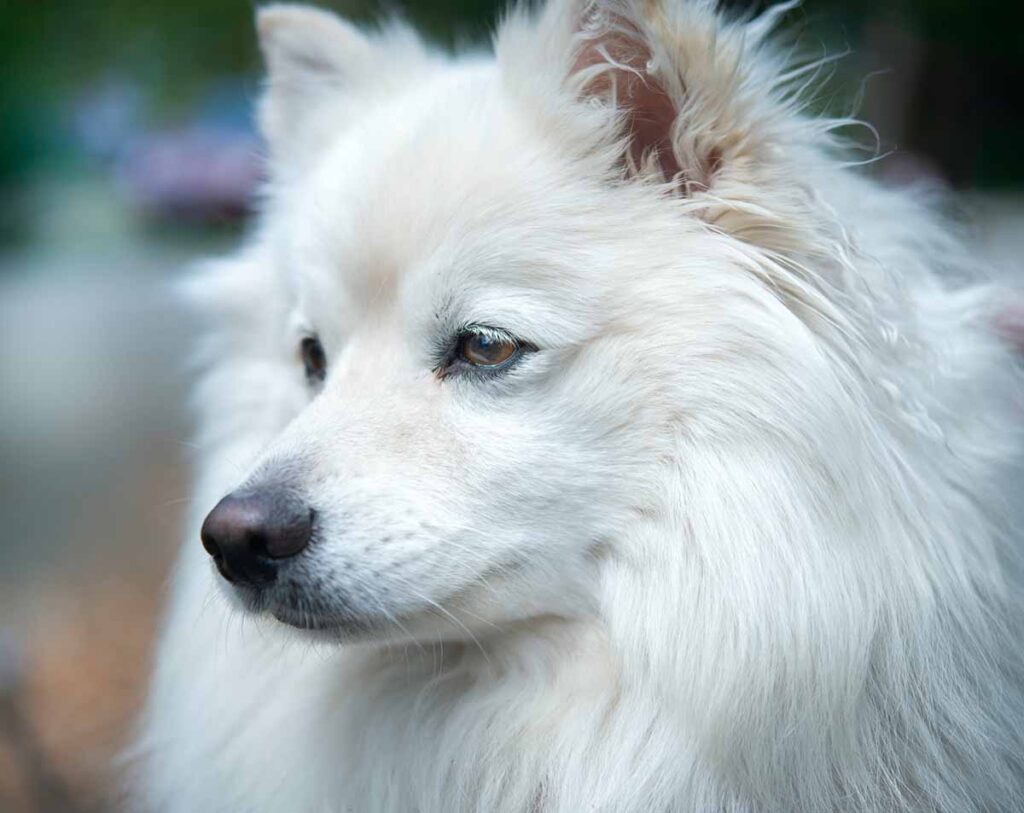
- Exercise: While Pomeranians love attention, they don’t need much exercise. However, it’s recommended to provide walks or let them run around an enclosed space.
- Health Issues: Their life expectancy is between 12 to 16 years. The breed has experienced luxating patella, tracheal collapse, and hair loss.
- Temperament: Pomeranians are friendly and playful. Sometimes, they are aggressive with other dogs or humans to prove themselves. They bark at new stimuli and are overly defensive. However, the breed responds well to training and is very persuasive.
- Family: Pomeranians can get along well with both cats and dogs. Additionally, they are good with children.
Icelandic Sheepdog
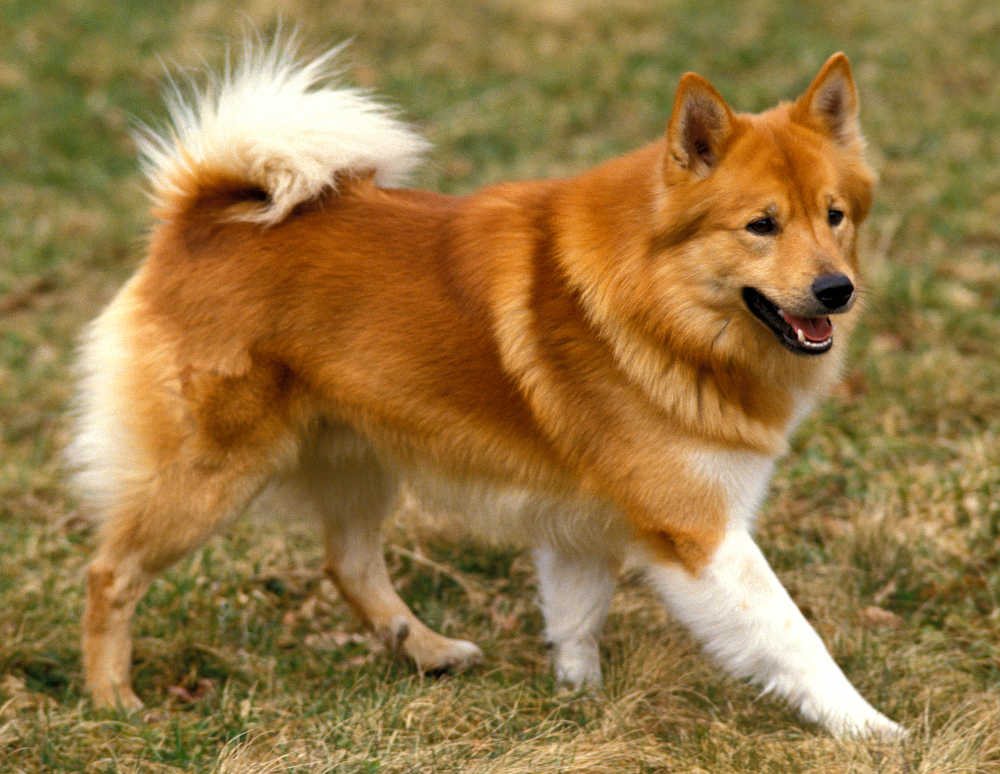
- Exercise: Their instincts require active and daily exercise. You need to provide frequent walks and play. Lots of families adopt these dogs as jogging companions.
- Health Issues: Icelandic Sheepdogs live between 12 to 15 years. They are prone to hip dysplasia and patellar luxation.
- Temperament: Due to their history of herding, they are tough and energetic. They love visitors and are friendly with strangers. Males are more laid back and cuddlier than the females. Be wary of their tendency to bark about anything.
- Family: The breed gets along well with children and other pets.
Alaskan Klee Kai
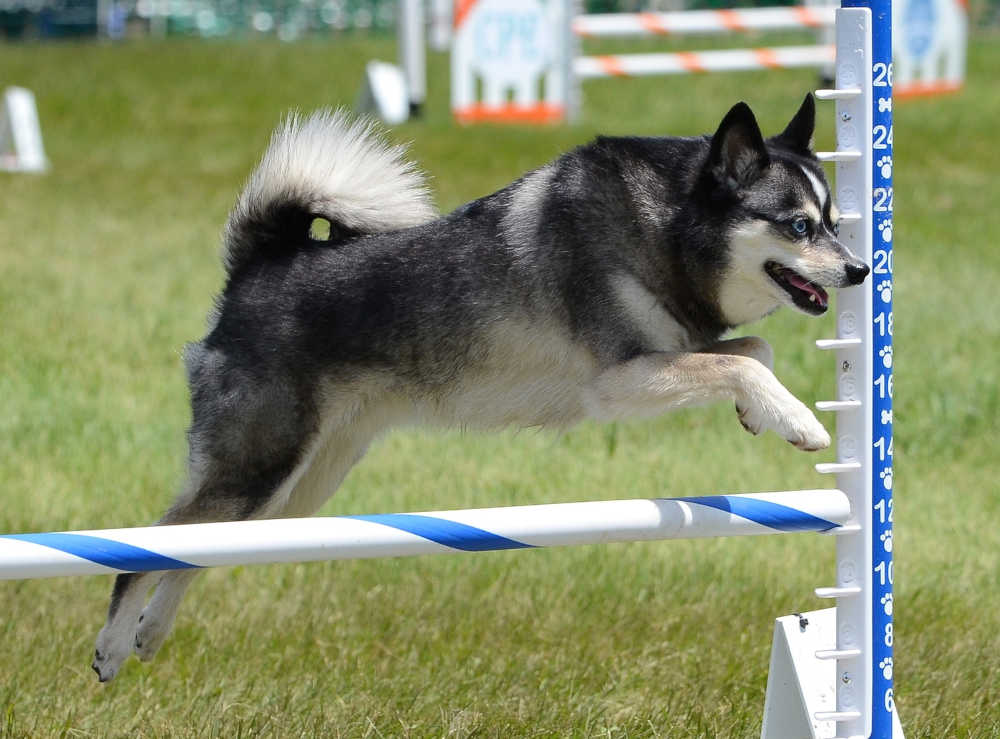
- Exercise: The breed excels at agility. They require about half an hour of exercise everyday along with plentiful playtime.
- Health Issues: Unfortunately, the breed is prone to developing juvenile cataracts, liver disease, heart issues, thyroid issues, and factor VII deficiency.
- Temperament: Their temperament is curious, aloof, and intelligent. However, they can become stubborn. Additionally, they are escape artists.
- Family: The breed can be good with children if socialized at a young age. However, some will not put up with their antics. Cats can be a gamble because of the dog’s high prey drive.
Miniature Husky
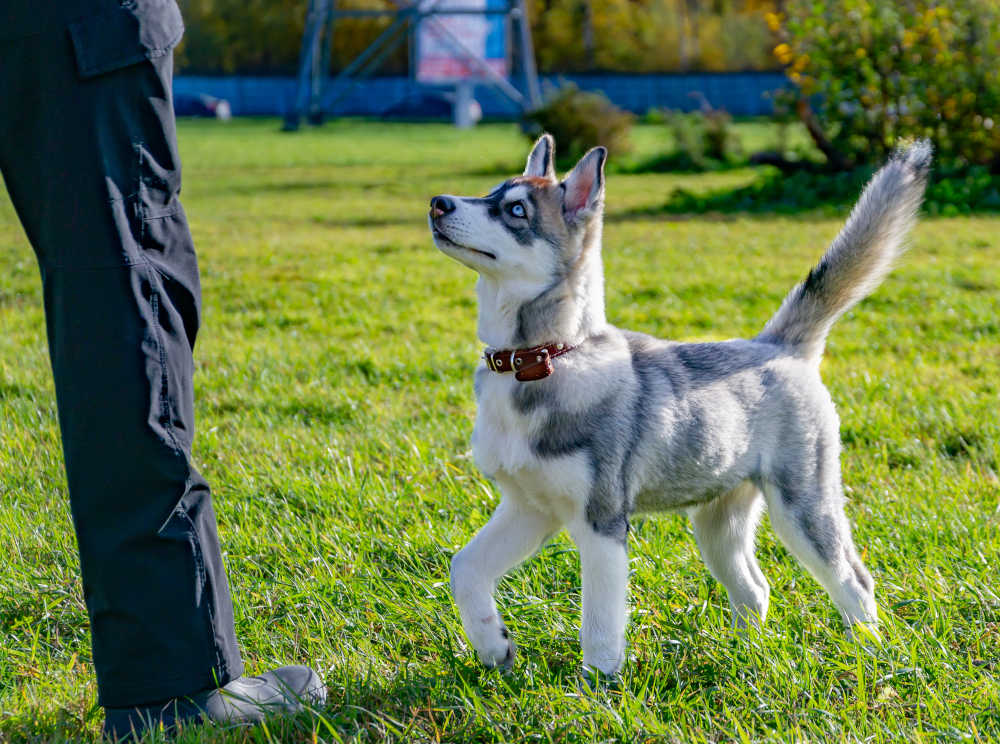
- Exercise: Just like the standard, this is an active and athletic dog which needs tons of exercise. They love to run and will become destructive if not given enough stimulation.
- Health Issues: Breeding for smaller sizes can introduce additional issues into the breed. This breed has a higher chance of breathing problems, eye issues, and intervertebral disc disease.
- Temperament: This breed can be clingy and love being the center of attention. They are loyal and friendly. Most miniature huskies are mischievous and playful.
- Family: The breed Is good with children but can be rambunctious. They are a great family pet because they are not aggressive with other dogs. They may chase cats but could be trained to avoid the behavior.
Canadian Eskimo
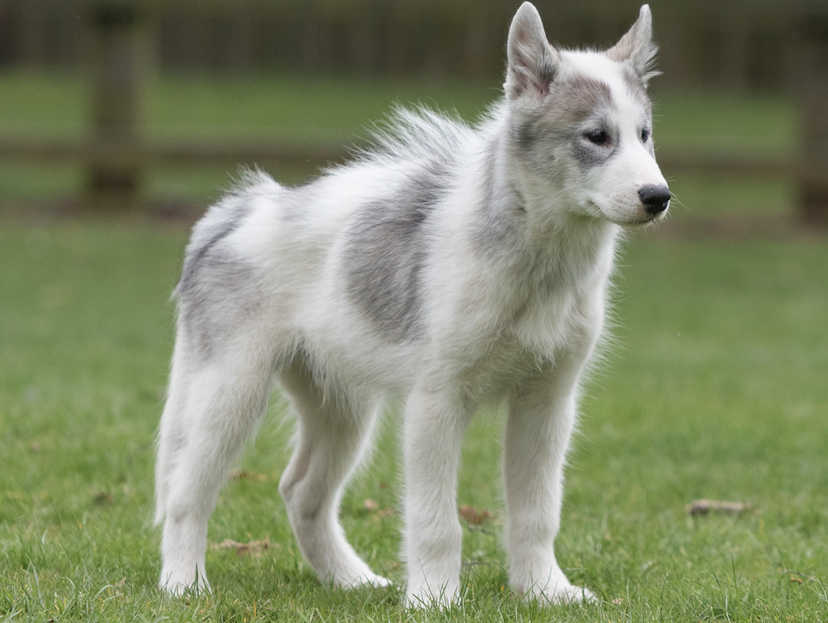
Below is an impressive picture of a Canadian eskimo dog fighting a polar bear:
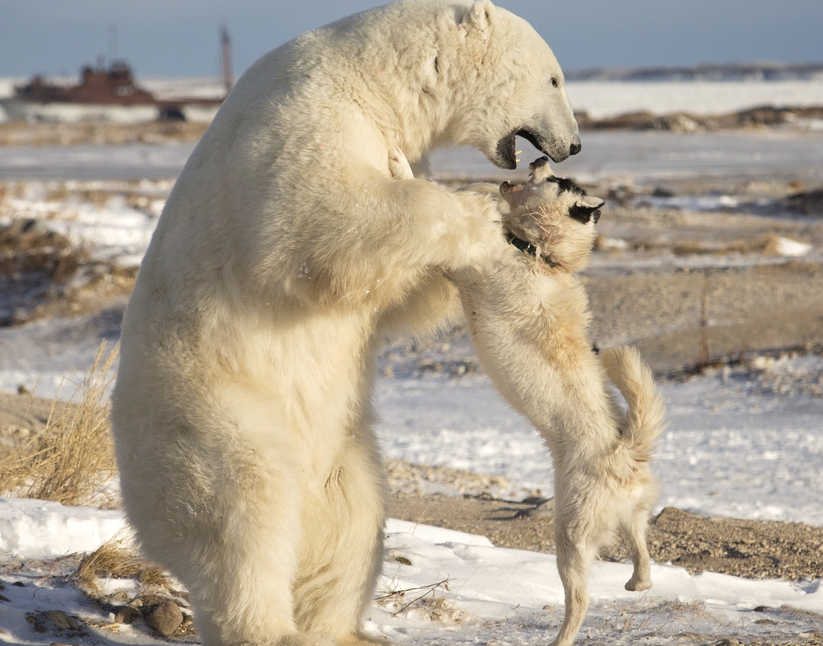
- Exercise: Walking isn’t enough exercise for this breed. They need higher intensity work and stimulation, which many owners cannot provide. They are often used in dog sports.
- Health Issues: The breed has no known inheritable disease. However, they could acquire Addison’s disease, allergies, or fertility problems.
- Temperament: Due to their lineage, they are loyal, brave, and intelligent. However, they are also affectionate and gentle. The dog develops a deep bond with their owner. Canadian Eskimos are very trainable and submissive.
- Family: Canadian Eskimos are great with children and are extremely playful. They can get along with dogs, as long as they are within their “pack”. However, keep cats or other small pets away because they will see them as prey.
Shiba Inu
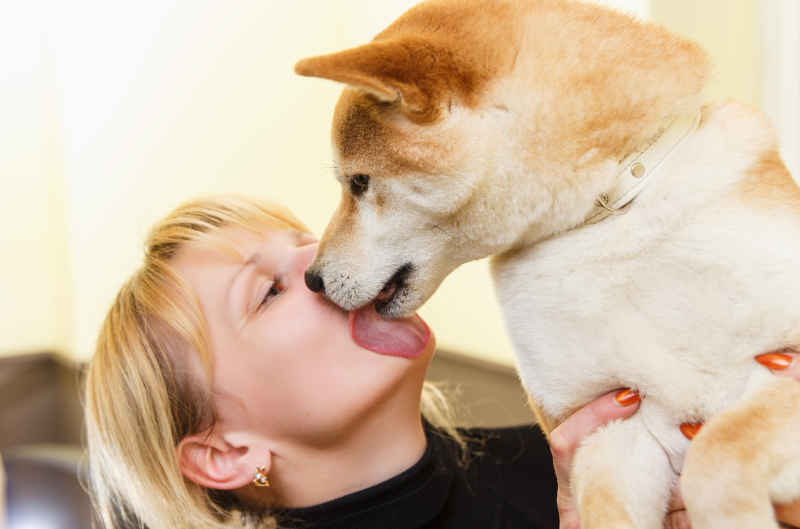
- Exercise: Exercise is needed to keep this breed living a long and healthy life.
- Health Issues: The breed is healthy, but certain health conditions may affect the breed. These include allergies, glaucoma, entropion, and luxating patella.
- Temperament: Shiba Inus are independent of spirit. They are fiercely proud that moves easily. They often clean themselves but are easy to house-train. When unhappy, they will do the “Shiba scream” which is a high-pitched, loud scream.
- Family: It’s best to socialize these dogs early as it helps them get along with other dogs and animals. However, it’s not a guarantee. Shiba Inus get along well with children.
Swedish Vallhund
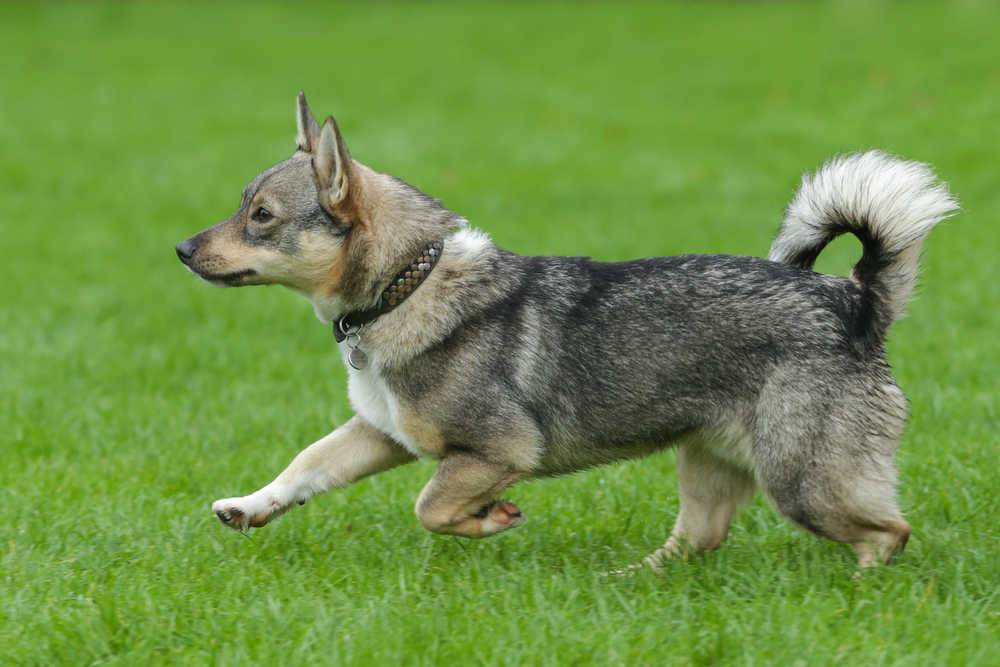
- Exercise: The breed does best in a house where they will have plenty of exercise and attention.
- Health Issues: Due to their small nature, the breed lives an average of 15 years. They do well in tropical climates due to their double coat but doesn’t do well in snow because of the short legs. Approximately 35% of the population has progressive retinal atrophy, which appears as night-blindness around age 10.
- Temperament: They bark due to their keen senses. The breed is friendly towards strangers.
- Family: This breed loves children, but their herding instincts can cause them to nip at feet or ankles. They are aggressive toward cats and dogs they don’t know but are okay with socialization.
2. Husky Cross-Breeds
While huskies themselves are often too large for apartment life or other living arrangements, huskies are often bred with smaller ones. These create crossbreeds which are smaller than the original but maintain some traits we love.
Pomsky: a crossbreed between Huskies and Pomeranians
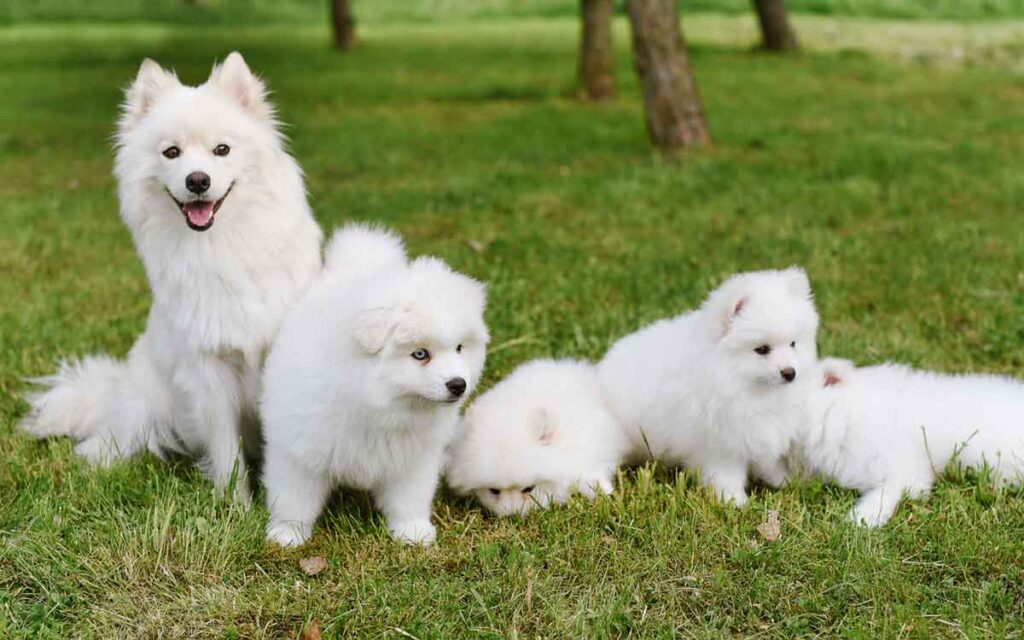
- Just like their Pomeranian parents, this breed loves to be the center of attention.
- This breed is affectionate with family but isn’t super great with kids.
- Their high intelligence makes them hard to train, and they bark.
- Major health issues include allergies and skin problems, collapsing trachea, epilepsy, and heart disease.
Horgi: a crossbreed between Huskies and Corgies
- These dogs are affectionate with their family and strangers. They are good with kids and other dogs.
- The horgi is easy to train because of their high intelligence. Be wary, as they maintain the husky’s potential to backtalk.
- They have high energy levels, which can vary based on their husky parentage. Some require more exercise than others.
- The health issues of this breed include dry eye and obesity.
Huskimo: a crossbreed between Huskies and Eskimos
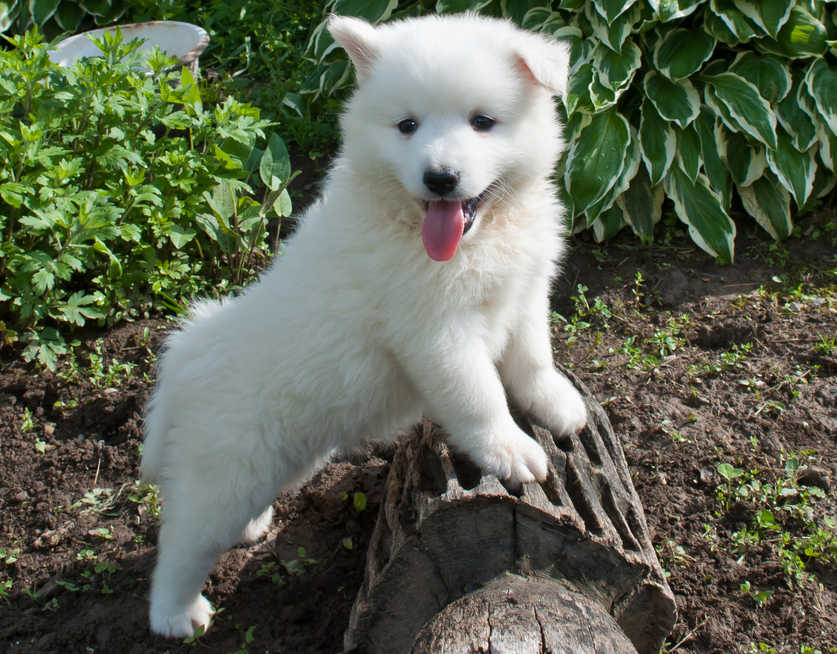
- This breed has a ton of energy while remaining loyal and playful to their family. They require a lot of exercise, or they will be out of control.
- They are great around strangers and are great with children.
- Major health issues include progressive retinal atrophy, hip dysplasia, and corneal dystrophy.
Hug: a crossbreed between Huskies and Pugs
- This breed is affectionate and is best for an active family.
- They are intelligent and quick to learn, which can lead to stubbornness.
- They require daily walks and exercise but would be good for an apartment.
- Major health issues include entropion, cataracts, hypothyroidism, and mast cell tumors.
Dachuksy: a crossbreed between Huskies and Dachshunds
- This breed requires a lot of exercise, or they will destroy your property. They need constant attention and don’t like to be left alone.
- They are funny and playful. The breed can learn tricks easily, but they will argue with you.
- However, this breed can be aggressive without proper training, which will lead to chasing other pets.
- Major health issues include intervertebral disc disease, hip dysplasia, and patellar luxation.
Shiba Inusky: a crossbreed between Huskies and Shiba Inus
- This breed is adorable but can be difficult to manage. They are escape artists with a high prey drive.
- They will need lots of exercise and mental stimulation. Obedience training is recommended since they are stubborn.
- Major health issues include cataracts, hip dysplasia, and allergies.
What should I consider before adopting a dog?
Adopting a dog is a laborious process. It’s important to consider many factors before you decide what breed you want to adopt. You want the dog to be a perfect fit for your family. Here are a few factors to consider:
- Exercise: Each dog breed will have different exercise requirements. Some breeds will be content to lounge on the couch for days on end, while others will become destructive if they aren’t stimulated enough. Huskies are beautiful dogs, which require lots of stimulation. If they don’t receive enough, they will bark endlessly or destroy your belongings.
- Health Issues: Some dog breeds are prone to certain health issues. If you are concerned regarding health issues, research to see which ones your breed may have. Additionally, this can be a financial consideration. If your dog breed is prone to certain issues, ensure your family is ready and able to afford the corresponding treatment. Common health problems for huskies include cataracts, hip dysplasia, and hypothyroidism.
- Temperament: Personality is probably the biggest factor to consider in adopting a dog. Some people are okay with a dog breed who is independent, but others want a cuddle bug. Some dogs are okay with being alone, while others never want to be. These are significant areas in which you will have to evaluate your life to see whether that dog breed would be a good fit for you. Huskies are affectionate and good natured.
- Family: If you have children or other pets, you need to consider whether your prospective dog is good with these things. There are many breeds which don’t do well with cats because of a high prey drive. Other breeds don’t have much patience for children. Huskies are good with children and other pets.
Disclaimer: This website's content is not a substitute for veterinary care. Always consult with your veterinarian for healthcare decisions. Read More.

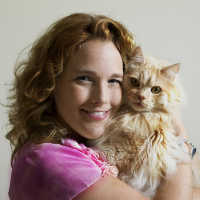
Be the first to comment